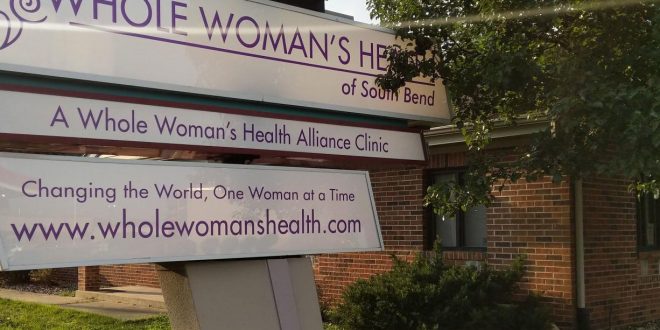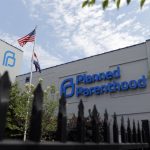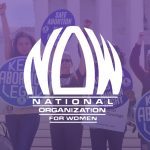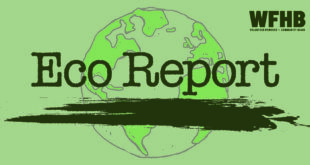Podcast: Play in new window | Download (Duration: 8:43 — 20.0MB)
On March 30, Indiana Governor Holcomb signed an executive order to cancel or postpone all non-invasive and non-essential health care facilities in Indiana. This order applies to all health-care providers however the discretion is left to them where services can be delayed or postponed if it causes harm to their patients.
The World Health Organization classifies abortion as essential healthcare however many states have gone as far as to completely shut down clinics.
The order is said to have been pressured to happen by many pro-life organizations, members, and politicians. According to Time magazine, many states such as Texas, Ohio, Iowa, Alabama, and Oklahoma have already taken steps to temporarily ban procedures by clinics during the coronavirus outbreak.
The Indiana executive order does not completely ban abortion, meaning that some services are still available for Hoosiers and some clinics have remained open for emergency care.
After expressing the health care facilities that would be put on hold such as hospitals, surgical centers, vets, dental offices, dermatologists, and abortion clinics, Holcomb stated publicly “Unless, of course, by doing so would cause harm to the patient, in which case, I would leave up to the doctor to determine and decide. Any and all medical expertise and personal protective equipment first needs to go toward… defeating COVID-19.”
U.S. Republican Representative for South Bend, Jackie Walorski publically sent a letter to Governor Holcomb classifying abortion as non-essential. She said, “Such a clarification would demonstrate Indiana’s commitment to the sanctity of life and to protecting not just the unborn, but all Hoosiers since it would help reduce the spread of coronavirus and conserve vital resources.”
***
All-Options Pregnancy Center is a national client-centered organization that provides support for people through pregnancy, parenting, abortion and adoption services. Executive Director of All-Options, Parker Dockray spoke on behalf of the organization and how they have been dealing with the effects of the pandemic during this time.
Dockray described one of the center’s primary source of care to people in Indiana, the Hoosier Abortion Fund. The program will be five years old this May. The fund provides diapers, pregnancy counseling, and support for all options. Dockray said that last week they got twice as many calls as they normally would get. This, she said is most likely a direct result from people getting laid off, losing wages, and losing insurance and health care aid.
When distinguishing the difference between “non-essential” and “essential” healthcare, Dockray explained that dentist and doctor offices can only provide essential and critical care that cannot be postponed. She said a lot of family clinics are not doing things like pap smears and doing things remotely to continue to help.
She continued to say that “Abortion is an essential healthcare procedure in all times, and even more so in a pandemic not less. It’s not less essential in this kind of situation.”
The issue of abortion clinics being essential and the availability of women’s healthcare has been a raised issue and tense subject long before the pandemic arrived. Dockray expresses this by explaining abortion care in Indiana, stating,
“You can only access abortion care in Indiana until you are about 13 weeks pregnant as it is, so we work with a lot of people that have to go to Illinois or Ohio to find care after 13 weeks and that’s another factor you know if somebody is 11 weeks pregnant now, they can’t wait for two weeks or three weeks or a month or that means they’re going to have to travel even further and potentially put everyone at risk. The more we can get people in for essential care quickly the better.”
Dockray expressed her feelings on the issue taking states like Texas for example, who have explicitly ordered the closure of all abortion clinics unless it is to save the life and health of the person pregnant for the next couple of weeks.
“For some people, it is going to be getting later abortions because if they can’t get the medication abortion and they have to wait a month until hopefully this is either resolved in the courts or things loosen up a little bit with public health restrictions we’re going to see people seeking second-trimester abortions when they really didn’t want to do that.”
Dockray went on to express the importance of getting public health care for women and why the pandemic is putting more women in danger, financially and physically saying,
“People are even more desperate to access abortion care safely now then they are under normal circumstances when it’s already difficult because of course its all the things that are happening, the uncertainties, about safety about health, you know does coronavirus affect pregnancy, what happens if you go into labor, can you bring a person with you to the hospital? There’s just a million things floating around and people are losing their jobs and then they are losing their health insurance so it’s not surprising that more people are considering abortion and reaching out for resources and not able to access services that they would have been able to access before this happened.”
In terms of what All-Option’s priority is right now, Dockray said that the organization is fortunate to be already working remotely and have started working from home while still providing most of its services. All-Options provides a number of services including a National talk line, their abortion fund, and the Diaper program.
The diaper program has been providing diapers to residents in Bloomington and has seen an increase in costumers recently because of people losing their jobs and having issues affording diapers or finding correct diapers from stores because of bulk buying.
Through emergency funding from United Way and the city of Bloomington, the organization has been able to still provide diapers to people’s homes with a “no-touch no-contact” delivery service to give people what they need.
Dockray says, “Our priority is making sure we are trying to meet people’s basic needs, which we know so many people are suffering right now and trying to do that and making sure we aren’t putting any people at risk, our clients and our staff or volunteers.”
As for the long term effects, Dockray says that it is clear that many of the health care facilities will face issues longer than the duration of the pandemic anxiety. She explains how All-Options has had to think ahead for the safety of their organization and how the pandemic has made a dent in the public health crisis already in the U.S.
“I do think that some elements of this are going to last for a long time, so we are already thinking about how do we re-structure our diaper program and our abortion fund” Dockray explains, continuing, “this whole situation has really exposed a lot of the public health crisis and the failure of our safety net systems… the coronavirus is really revealing just how bad the support is for people.”
Dockray expresses the negative effects that the health facility ban will have on abortion clinics, especially for those who have to remain closed for at least two weeks stating, “Most abortions are provided by independent abortion providers” and continuing on to say,
“they can’t survive for a long time with these restrictions and the added burdens that are being put on them and so I think there is some real danger of like in Texas, if those clinics stay closed for too long they may have a really hard time re-opening and even when you get to a more normal situation and clinics are able to reopen then you have even less access in those areas then you had before. So I feel that way for all small businesses, it’s going to be a real struggle to see what we can come out with on the other side.”
 WFHB Bloomington Community Radio
WFHB Bloomington Community Radio





